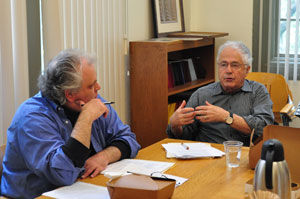
The Townsend Center’s Strategic Working Group program (SWG), generously funded by The Andrew W. Mellon Foundation, is designed to concentrate on foundational questions and emerging conditions in the humanities. The Townsend Center is accepting faculty applications for participation in the 2013-14 Strategic Working Group on Law and Humanities. The co-conveners of the SWG will be Marianne Constable (Rhetoric), Leti Volpp (Boalt School of Law).
The Law and Humanities Strategic Working Group seeks to explore what is at stake in the directions that United States legal scholarship has taken in recent decades, as it has moved away from its historical roots in the humanities and soft social sciences to seek validation in quantification. Our project here is concerned with the formation of the discipline of law in its broadest sense. We wish to interrogate not only the texts but also the media and contexts, institutional and social, through which law has become the domain of practice and knowledge that it is; we will also consider the role that the humanities might play in contemporary law and policy.
Justice has long been a subject of inquiry for texts in the fields of philosophy, political theory, history and literature. These texts have taken law to be a site of justice or, at least as a site in which issues of justice can be addressed. Jurisprudence and social theory have offered a range of answers to the questions of who we are, what to do, and how we know. Today, law schools turn increasingly to the quantitative social sciences and to economics to address social problems. Such approaches address longstanding questions in ways that rely primarily on methods and frameworks that tacitly foreclose particular sorts of answers. The rise of law and economics, combined with the marginalization of critical studies and critical theory, means that even socio-legal studies has been increasingly pulled toward the methodological requirements and outcomes of quantitative and statistical research. The relation of law as policy-making to traditional humanistic accounts of justice becomes a pressing issue, even as the relevance of the humanities and of humanistic studies to professional legal study has been called into question.
Themes and topics will depend in part on the interests and expertise of group members, but will include: the ways in which law has considered particular fields and approaches important to it; how questions of obligation, membership, and language have been understood within particular legal traditions and are currently operationalized in law and policy studies; and what humanistic approaches and emphases have to say about these questions. Our own focus has primarily been on United States law, but we welcome those with other related regional, comparative or international law interests.
All ladder-rank faculty at UC Berkeley are eligible to apply.
Up to five additional faculty participants will be chosen based on their intellectual strength, their ability to contribute openly to a collaborative process, their representation of different relevant disciplines, and their commitment to the program’s intellectual goals. The Townsend Center encourages the inclusion of one or more non-humanities faculty among the participants in the group.
The SWG will meet once a week during the spring 2014 semester. Participants will receive a 50% research leave from teaching responsibilities for the spring semester (one course). The level of course replacement funding is set at the Assistant Professor level, Step 2, as determined by the Arts and Humanities Dean’s Office. Detailed information on the Townsend Center course replacement funds policy can be found on the Townsend Center’s website.